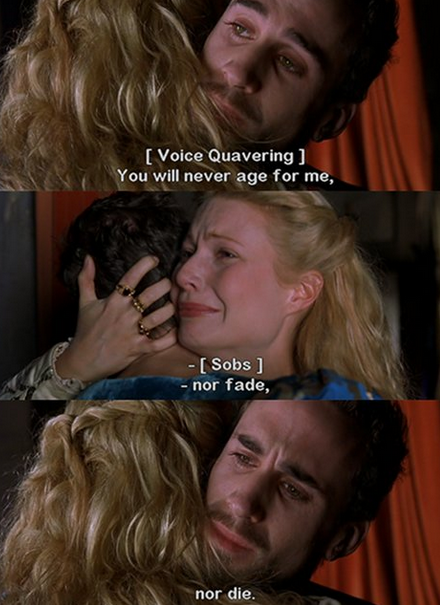Shakespeare in Love, the 1998 film that won the heart of the Academy after snagging a total of seven awards including Best Picture and Best Original Screenplay, details the period of William Shakespeare’s life during which he was writing Romeo & Juliet. The imagined inspiration behind his masterpiece is a wealthy lady named Viola de Lesseps (Gwyneth Paltrow), who has been promised by her father to the brutish Lord Wessex (Colin Firth).

After seeing Shakespeare’s plays performed at the Rose Theater, Viola becomes entranced by and enamored of his work, and therefore, him. However, her one qualm is the delivery of lines by the actors. Insistent that she can do the work more justice, she disguises herself as a man with the help of her Nurse (Imelda Staunton)–who, later, obviously, inspires the character of Juliet’s own Nurse. Armed with a wig and a glued on mustache, Viola auditions for the role of Romeo as Thomas Kent, immediately catching Shakespeare’s attention with his passionate recitation of the lines.

Unaware that it was Shakespeare listening to her until he starts to chase after her, Viola must conceal her identity from him in order to get the part. This masking of her true self, of course, does not last for long. In any case, the intrigue, androgyny and presence of Judi Dench as Queen Elizabeth 1 tend to make Shakespeare in Love, dare one say it, more entertaining than Romeo and Juliet itself.

The rich, poetical script of Tom Stoppard and Marc Norman offers us a glimpse into Shakespeare’s fantastical, fly-by-the seat-of-his-pants world, making Romeo Montague seem like a cold fish by comparison. Moreover, the love between Viola and William seems of a superior quality as they are both bonded by a play that they have equally shared a hand in creating–Viola as muse and William as writer genius. Their alter egos, Romeo and Juliet, surely hold a candle to them, but it is one that burns more dimly than their own impassioned affair.






















